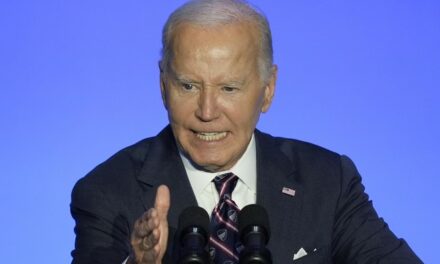We support our Publishers and Content Creators. You can view this story on their website by CLICKING HERE.

The Biden administration’s Consumer Financial Protection Bureau (CFPB) has finalized a new rule preventing credit reporting agencies from using unpaid medical debt to determine a consumer’s credit score.
Advertisement
This is welcome news to deadbeats. Not so much for the rest of us.
Medical debt, like all other debt, is money borrowed from someone else. When people don’t pay back what they borrowed, the cost of borrowing goes up for the rest of us.
“People who get sick shouldn’t have their financial future upended,” CFPB Director Rohit Chopra said in a press release. Chopra added that the rule will “close a special carveout that has allowed debt collectors to abuse the credit reporting system.”
That may be so, but there are many other considerations that need to be addressed before waving Biden’s magic wand and making medical debt disappear. He’s been trying to do it with student loan debt for four years without regard for consequences or moral hazards.
Bankers are raising the alarm about the new rule. They say that consumers may be extended more credit than they can afford if medical debt is removed from the equation.
“Credit scores would increase as a result of the proposal [but] those scores would be artificially inflated; they would only rise because certain relevant data would be suppressed. Thus, credit scores would be less reliable, which would compromise lenders’ ability to engage in risk-based underwriting, and credit markets would become less efficient as a result,” the Bank Policy Institute and the Consumer Bankers Association wrote in a letter to the CFPB.
Advertisement
Debt collection groups also opposed the change. The Association of Credit and Collection Professionals said in a statement that the rule would result in “reduced consequences for not paying your bills, which in turn will reduce access to credit and health care for those that need it most.”
The White House argues that medical debt should be treated differently than other kinds of debt incurred from overspending such as taking out a loan to buy a house or car that a borrower may not be able to afford. Officials say medical debt is not optional and often necessary, therefore should be treated differently.
The White House counters that medical debt is different because, unlike too much credit card debt or taking on “too much house,” medical debt is not optional.
Why does that mean it shouldn’t be treated like all other debts? They don’t say so.
Republican lawmakers have already said they will try to roll back certain Biden-era regulations through the Congressional Review Act, which lets Congress repeal agency rules through a majority vote in both houses.
Some Republicans on the House Financial Services Committee have already signaled that the rule canceling medical debt could be at the top of their list. They sent a letter to Mr. Chopra in August saying they had “serious concerns” over the rule, which they say will “weaken the accuracy and completeness of consumer credit reports.”
They added, “This effort will have significant negative effects on access and affordability of credit for all consumers and particularly for low-income borrowers.”
Advertisement
Credit card companies will be more tightfisted with credit limits. Banks will take a more critical view of other credit markers. As the Times article indicates, this will impact low-income borrowers more severely.
It’s a rule that will force even more people into bankruptcy for taking out loans based on inflated information.

 Conservative
Conservative  Search
Search Trending
Trending Current News
Current News 







